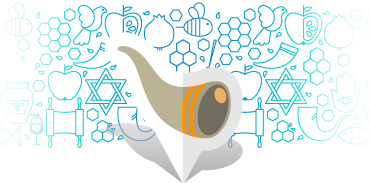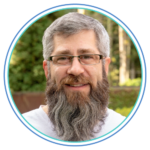
Back to Adam
Rabbi Damián Karo | Templo Libertad, Buenos Aires, Argentina
Dean of the Ibero-American Institute for Reform Rabbinical Education
Rosh HaShanah marks the beginning of a new cycle. Celebration time’s call for reflection and from there to rethink our daily practices. In the Jewish thought, time is circular, and not just in annual cycles. Historical time is a process of overcoming and reparation that is framed between Paradise and Messianic Time, two mythical ideas of the perfection, of absolute good. From this conception the human being is thrown into an imperfect existence, which happens between these two extremes. From biblical myths, we symbolically relate the beginning of a new year to the creation of Adam, the first human being. Let’s study some interpretations of this story.
Adam is created one and only with earth and divine breath. Let’s work on two questions searching inspiration for our time, what do we learn from the story about God creating a single human being and then dividing him? And what does that earth with which it is created teach us?
The Mishnah (Sanhedrin 4:5) interprets that Adam was created unique to teach us that whoever takes or sustains a person’s life is considered to be destroying, or sustaining, the entire world. Also for the peace among creatures, so that no one tells their partner: my father is superior to yours. And to teach us the greatness of the creator. The person, when minting coins, does so from a seal and they all look alike. Instead, the Mishnah clarifies, God created each human with the seal of Adam and yet none resemble each other. This is why each one must say: the world was created for me.
We learn from this text that people are all equal in value and importance and, at the same time, as works of the divine and miraculous, we are all different. In Hebrew human being is said “son of Adam.” It also teaches us that we should not differentiate between human beings. The world was created for each of us, making us unique and responsible. The life of each human being is as sacred as the life of the entire world.
Why was Adam created unique? For the righteous and for the wicked. So that the righteous do not say, we are children of the righteous, and that the wicked do not say, we are children of the wicked. For the families, so they don’t provoke each other. If they provoke each other anyway, imagine if he had created two human beings. Also, the Talmud points out three differences between people: voice, appearance, and their thoughts. Adam was created at last place, so that if he became arrogant we could tell him: the mosquito was created before you.
We see that the responsibility for our actions does not relate to our origins. Families should be on an equal footing and do not make differences. We people distinguish ourselves by our expressions, appearances, by the shape of our bodies and faces, and by our opinions and thoughts. And that we should be humble.
According to Rabbi Meir (Sanhedrin 38a), Adam was created with earth from all over the world. It teaches that there is a relationship between our body and the entire planet. In another interpretation the Midrash Rabba (Bereshit 14:8) says that God created Adam with earth taken from “the same place from which he will atone for his errors” and wished: “Hopefully he will stay alive.”
It is interesting to remember that in Hebrew vowels are not written, and written letters form families of words that are related. The “place from which he will atone for his errors” refers to the altar where the offerings (KoRBaN) are brought (KaRoB). We see a relationship between the body and the possibility of getting closer, of coming back from the mistake, of reparation. The wish “Hopefully he will stay alive” describes the responsibility that comes with freedom of choice. In other words, the human being can act in such a way that destroy life, both one’s own and the world’s. In addition, it refers to the fact that the human being is as imperfect as the world that surrounds him, so that the process of overcoming and reparation must be oriented both to himself and to the world.
The Talmud (Brachot 58a) expresses that who sees a multitude recites: “Blessed is the knower of hidden thoughts”, since the inner thoughts (PNiM) of some are not similar to those of the others, nor do the faces (PaNiM) resemble each other. He says that once Ben Zoma saw a crowd and said: “Blessed is the knower of intimate thoughts” and “Blessed is who created all these people to serve me.” According to this story, Ben Zoma used to say: “How much effort did Adam must have done to get bread to eat! He plowed, sowed, reaped, sheaved, threshed, winniwed, separated, ground, sifted, kneaded, baked, and then ate. And I wake up and find all of these prepared for me. How much effort Adam must have done to get clothes to wear! He sheared, laundered, combed, spun and wove, and then had clothes to wear. And I wake up and find all of these prepared for me.”
The text continues with another reflection by Ben Zoma who also used to say: “What does the good guest say? How much trouble did the host take to serve me! How much meat did he bring before me! How much wine did he serve before me! How many loaves did he bring before me! And all the trouble he took was only because of me! And what does the bad guest say? What trouble did the host take? I had one bread, a piece of meat, and a glass of wine. All the effort the host did was only for his family.
We are one within Adam but different in our thoughts and in our faces. And we bless that multiplicity. Diversity allows us to survive. As Ben Zoma says: without the others, alone like the original Adam, we could not even satisfy our basic needs. Furthermore, without a proper bond with the planet, the body and at the same time the host, we couldn’t stay alive neither. We are guests of a world that gives us life and we should be grateful.
Our sages teach us, that even if we differ through our bodies, voices, faces, thoughts and opinions, we are one within the mythical Adam. That everyone’s life is sacred in equal measure and that we should not make differences. That we need each other, that we complement each other, and that each one is responsible for the other and for the planet. That we are not the owners of the world but guests and guardians. That we can make mistakes, and that taking responsibility implies acknowledging our mistakes with humility, get closer and repairing humanity and the planet.
It is time to return to Adam, to focus on the interrelationship between the humanity’s life and the planet’s life, recognizing that we are one same body. To embrace, from the encounter´s culture, what is different in the face of the other, as sacred as one’s own. To be grateful, instead of despising, for the gift that life is. To remember that we are imperfect but that on earth there is the ability to get closer and offer ourselves, and to repair our mistakes. It is time to exchange selfishness for love, to put into practice the divine desire for the common good, to take responsibility and to sustain human and planetary life in its diversity, and celebrate it.
❚ Back to Previous Page ❚


